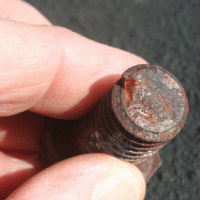One of the most common features of machinery, consumer products, and assemblies of any type is the bolted joint. Sometimes the joint fails, with results ranging from inconsequential to catastrophic. The design of a joint is in the purview of an engineer, who must consider the material to be joined, the geometry of the joint, the loads imposed on the joint, the strength of the connectors (i.e., bolts, screws) environmental effects (i.e., temperatures, corrosion) and perhaps other factors.
We have investigated a number of bolted joint failures at Warren. Often, it is helpful to perform a metallurgical examination of fractured bolts or screws to determine the mode of failure, for example, failure due to overload or failure due to material fatigue.
If a bolt fails due to overload, the cause of the overload must be ascertained- was it due to an unexpected external load on the joint, or was it an inadequate design? Both tensile and shear loading must be considered.
If a bolt failed due to material fatigue (such as the classic example of bending a paper clip back and forth until it easily breaks), was fatigue loading considered in the design? Fatigue failure occurs only when there is a cyclic component of loading. A bolt that is preloaded by tightening properly is much more capable of handling cyclic loads. Consequently, fatigue failure of a bolt is not necessarily due to inadequate design- it may be due to improper tightening or failure to maintain the proper preload over time.
A joint designed for high strength fasteners, such as Grade 8, should always be reassembled with an equivalent or higher grade fastener. The grade of a bolt can be determined by the markings on the head of the bolt. Failure to attend to this kind of detail may result is serious injury or death when a component fails.
Founded in 1997, The Warren Group, forensic engineers and consultants provides technical investigations and analysis of personal injury and property claims as well as expert testimony for insurance adjusters and attorneys. Extremely well versed in the disciplines of mechanical, electrical, chemical, structural, accident reconstruction and fire and explosion investigation, our engineers and consultants are known for delivering the truth — origin, cause, responsibility and cost of an event or claim — with unmistakable clarity.




